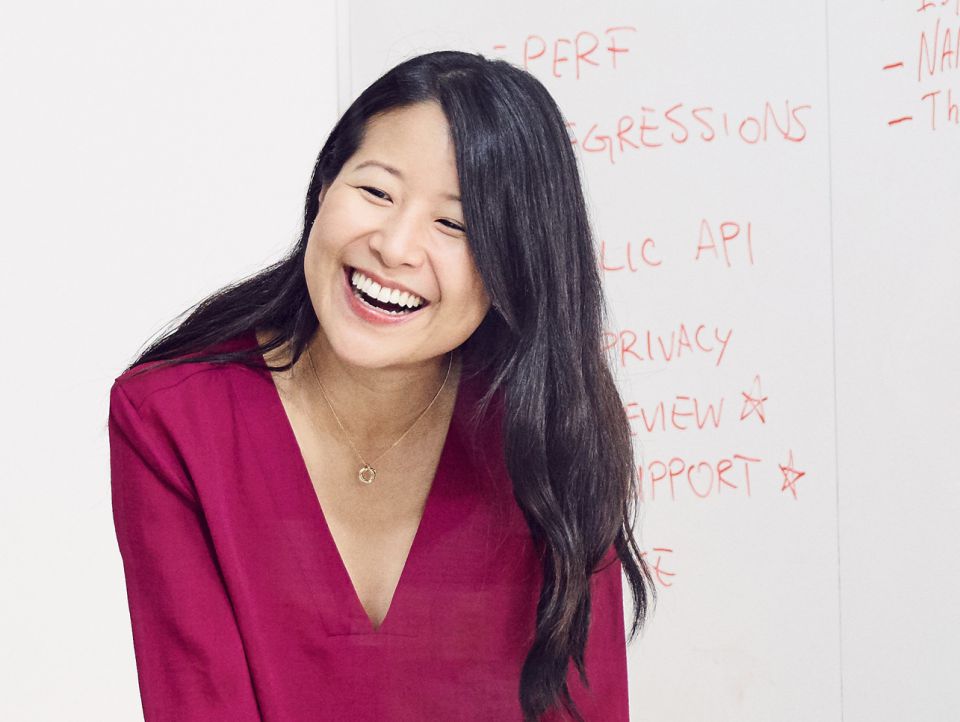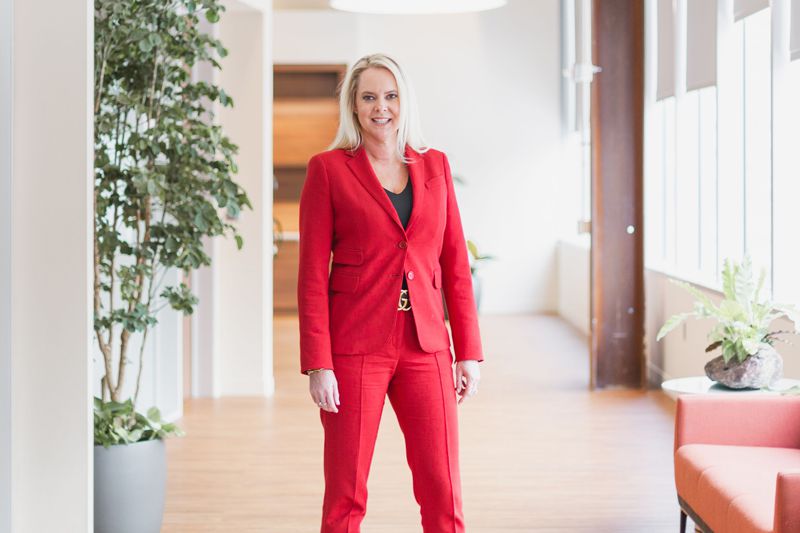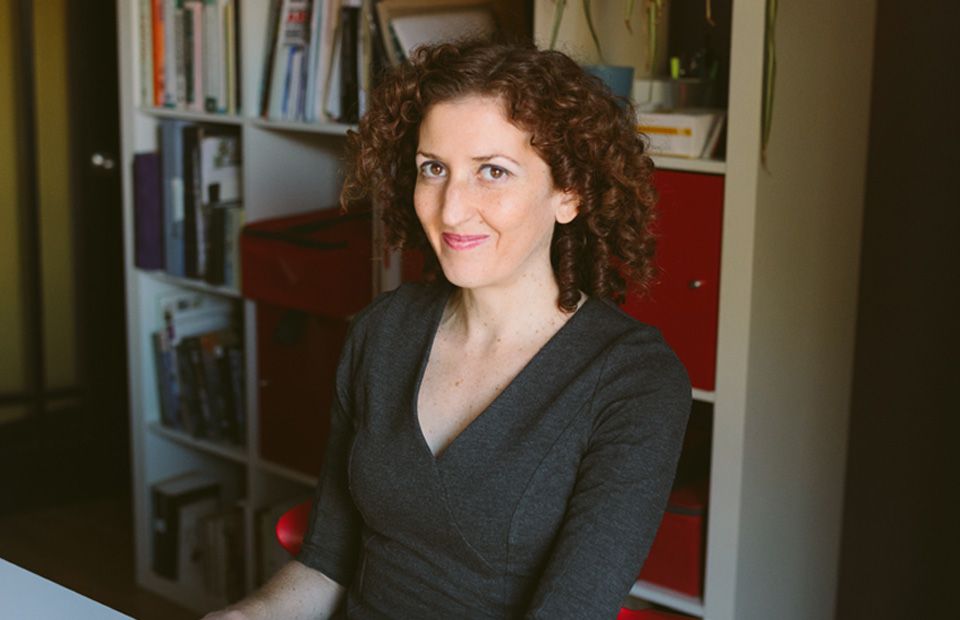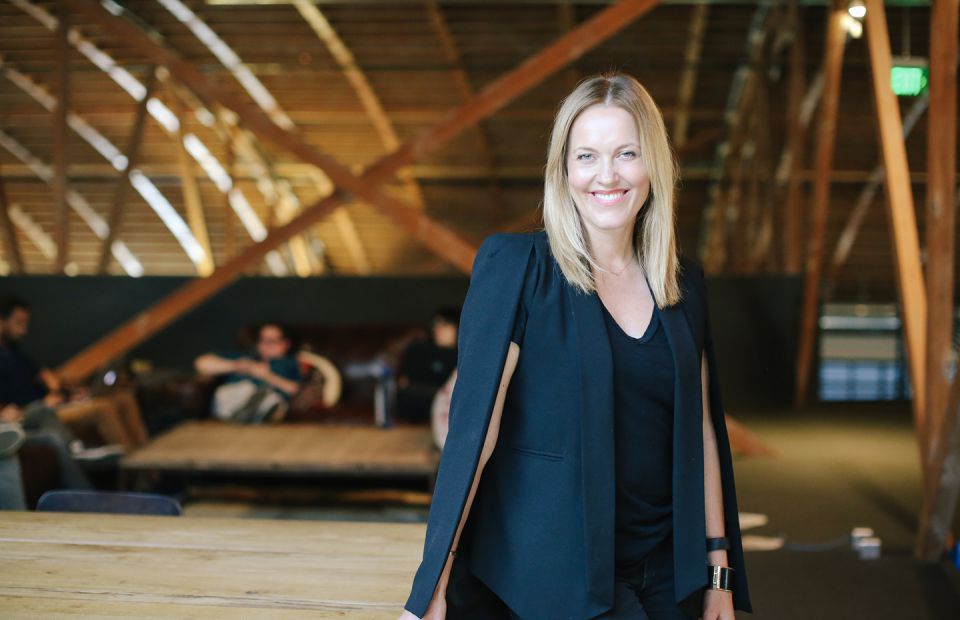“If only I could quit my job and move to South America....” “That job looks cool. I’d apply but…” or simply, “Maybe there’s something more out there.”
Those nagging doubts pop up in all of our minds—during sleepless nights or quiet moments on the train—but most of the time, we quash them out of fear that we'll disrupt our imperfect but predictable status quo. Well, Kathleen Prior Louis proves that sometimes, it’s worth following that “go for it” gut reaction.
Prime example: As a rising senior on the Dean’s List at the University of Cincinnati, she skipped the traditional "thesis/job application/graduation” route for an unforgettable ski season in Lake Tahoe. Although she wouldn’t recommend dropping out, her detour does demonstrate how staying open to experiences of all kinds has shaped her career so far.
Working in business development after graduation, she felt comfortable enough but sensed something was missing. So when one of her mentors offered her a talent acquisition role, she decided to take it and explore her then-untapped ability to connect with people. Now the VP of Talent Acquisition at SteelHouse, her role goes beyond just “acquiring” talent—she helps them succeed once they're there through personal—and financial—investment in their happiness ($2,000 vacation stipend, anyone?).
So next time your instinct’s screaming at you, listen to what it’s saying. Chances are, you won't regret it—even if it doesn’t lead to the slopes of Lake Tahoe.
Her Starting Point
You studied both Communications and Psychology at the University of Cincinnati, although ultimately you decided not to continue after three years there. What unique perspective did your studies, and leaving them behind, bring to your career?
Studying both disciplines has absolutely been helpful to me in my career and with life in general. Everything comes down to communication—it’s not only about how you get your thoughts across, but how well you listen. Understanding people, their motivations, and what motivates them is helpful as well.
The classes required for both majors truly opened my eyes and expanded my horizons. Behavioral psychology and understanding more about the human psyche was fascinating. It was helpful to understand more about how individual experiences, mixed with DNA, help shape people, their response to life, and what makes them unique. It was a very interesting exploration of the whole nature/nurture thing. I also took city planning/administration and accounting classes, which not only helped with organization and logic but also showed me what I didn't want to be doing.
The three years of college were invaluable in framing the beginning of my career. Life and work after undergrad was my grad school. I do not recommend dropping out—that just happened to be my path. I do believe completing school is important for most people and highly recommend it.
After graduation, you worked in business development before switching to talent acquisition. What sparked that change? Was there an a-ha moment when you realized talent acquisition was for you?
Yes and yes! I loved working in business development and sales, but it was just part of the journey to find out what I did and didn’t like doing. I had some big wins and good training early on, but there were still pieces missing which kept me searching. Every opportunity I had was a result of my work, energy, and networking. The path I chose wasn't exactly obvious, but it worked out!
The pivotal moment that turned me onto talent acquisition was when I asked a long-time client and mentor to have lunch with me so we could brainstorm about my next move. I was looking for guidance, and because he was connected to a lot of interesting businesses, I knew he would have great ideas. He owned boutique staffing agencies, among other businesses, but I never imagined he would suggest a career in talent acquisition for me. I actually had my eye on a totally different role, but he pushed really hard for me to explore a role on his team. And although I wasn't sure about the fit at the time, I was open to listening and valued his advice. Weeks later he called and offered me the position of running his LA agency and I accepted. He was great at seeing a good fit when it was there, and much later, I understood that I possessed that same talent. I had a knack for working with people, understanding teams, assessing strengths and weaknesses, and then filling the gaps with the right people.
Most of your jobs have been at media, technology, and advertising companies. What excites you most about that industry?
I love advertising, media, and technology—especially when they all come together. One of my fathers owned and operated advertising agencies, so I grew up in the business. As a young girl, I would go to his office and loved the buzz. It was such a cool space with beautiful art covering the walls. I spent my time listening in on creative meetings, hearing accounts on the phones with clients, observing account leads working with designers—it was all very exciting! It was still a bit of the Mad Men era, which is hilarious, looking back on it. My father’s office had a bar and pool table, and he would host meetings there while the team would drink scotch and play pool. I thought they were just the coolest, most creative people, and they always looked like they were having fun at work! My other father was a successful executive in the insurance business, so from a young age I would listen in on business calls. I absolutely loved hearing him pitch business and negotiate. He was always laughing, so it must have been ingrained from an early age to find joy and humor in work.
The energy and pace of tech companies are very distinct—add in media and advertising, and it’s the perfect combination. Technology changed the corporate landscape, and I find the convergence of media and tech with advertising exciting because it’s a fast-paced environment that values innovation and creativity. It’s the perfect combination of what excites me most about this business.
What brought you to your current job as Vice President of Talent Acquisition at SteelHouse? What professional experiences prepared you most for the role you’re in?
Leading talent at SteelHouse is a “full circle” moment in my career—every position I’ve held has absolutely led me to this point. I worked at my first startup (a mobile content company) with SteelHouse's Chief Product Officer, Marwan Soghaier. He had reached out to me a few times regarding SteelHouse and the timing had not been quite right, but I kept an eye on the progress the company was making. He then reached out again and the timing seemed like it could work. My first call with our CEO, Mark Douglas, was originally scheduled for 30 minutes, but ended up lasting two hours! It was the first time I’ve spoken with a CEO that was so passionate and such a visionary in regard to company culture. I was extremely excited. The challenges and opportunities were perfectly aligned to where I was in my career and in life.
[In] every role I’ve ever had, ranging from the hyper-growth startup of Hulu to my first global publicly-traded company, Experian, I gained tons of perspective and knowledge. A few months before I came to meet with SteelHouse, I interviewed for a director of talent role at a large well-known tech and entertainment company. I really liked the company, but knew that it would be a stretch role, given their size, scale, and other challenges. I presented a plan to their head of talent and organization on how I would address the most important goals they were trying to achieve. I didn't get the job, [but] that small experience was an important step toward SteelHouse. My achievements—and failures—all prepared me for my current job as Head of Talent at SteelHouse.

Her Big Break
Can you give us a brief description of your job? What does a typical day look like for you? What do you look forward to most?
In a nutshell, it’s my responsibility to hire for the business and lead our recruiting team. I lead the charge in designing and implementing a great recruitment process, and make sure we’re using the latest and greatest tools and focusing on our employment brand. In addition, I sit on the executive team and make sure we’re aligning with company goals, communicating the latest to our team and vice versa, and keeping the team up to date on what we’re working on.
A typical day for me can vary from meetings with department leads, to discussing the needs of their teams, to mapping out upcoming positions and planning. I also recruit on a handful of positions from time to time as needed—living the life of a recruiter which entails sourcing for talent, scheduling calls and meetings where I interview and pitch SteelHouse to prospects. I’m sometimes a copywriter as well, writing content for SteelHouse or doing outside interviews. My team and I also plan bigger events like quarterly meet-ups, open houses, career fairs, and more. Speaking of the team, I meet with each of my team members one-on-one on a weekly basis, and have bi-weekly team meetings to not only keep them up to speed but for them to update me as well. I’m also constantly reviewing new solutions and staying updated on what’s happening in the talent and organization community.
I truly look forward to every part of my day—connecting with people and evangelizing SteelHouse is a joy.
SteelHouse describes its culture as “based on trust, ambition, and accountability” and looks for “people who naturally want to do more, own more, and make an impact in their careers.” How do you pick up those qualities from a resume or interview? What in particular stands out to you?
A clean, well-written resume that clearly communicates what a candidate does and does well is a good start. Even if it’s the beginning of their career when there is not a lot of work experience to write about, there are other indicators of the type of person who could fit with our culture. For example, if someone has just graduated, has good internships, and is active in the community or other organizations, this shows ambition and accountability. If someone has more work experience, their resume should show the types of companies, positions, and progression.
I recently had a great experience where someone wrote an incredible cover letter where they clearly communicated what they wanted to do and how they could fit—their passion jumped off the page and it was evident they would be a great match with our culture—you could really hear the kindness in their voice. We knew we had to meet the person and it was such a strong match, we hired them! It’s the same with interviewing more experienced people—it’s a matter of listening to their stories and interests, and being able to assess those qualities based on their responses.
In the interview, you’re getting to know someone on a deeper level, hearing their story, and understanding what’s important to them. There are clear qualities that stand out in getting to know someone. People who have a bit of an entrepreneurial vibe and can self-motivate do best in our culture.
As a manager (and former recruiter), you’re probably used to giving bad news. How do you deliver constructive criticism to your direct reports in a compassionate yet firm way?
I believe in being direct, yet kind. I try to follow that. It kind of goes back to the simple rule of treating others how you wish to be treated. I also like to compliment people because I try to always see the good things people do, and it’s important to recognize that. It’s equally important to know when there is an opportunity to make improvements and to call that out. I do my best to make everyone comfortable because I also want that for myself. If someone sees any area for improvement, I want to know about it.
How do you define success in your job? What accomplishment or project are you most proud of?
I define success by setting team goals based on the goals of the company and measuring how we achieve them. Receiving feedback along the way is part of this—from department leads to the candidates themselves. It’s a big win when both sides are thrilled with the process!
I’m really proud of scaling our team with the best possible people and hiring over 100 folks in the first six months of last year, all while implementing an applicant tracking system, best-in-class interviewing process, and boosting our employment brand with a lot of great press. The candidate reviews we received were very good for the most part, and for the ones that were less than stellar, I’m proud of the coaching and training we did to help ensure future reviews would be stronger.

Her Perspective
As women, we’re encouraged to negotiate our salaries when starting a job. But when we believe, and research shows, that we could be punished for it, that can be intimidating. When they’re negotiating a salary offer, how can women advocate for themselves without seeming arrogant?
It’s a balancing act of how you communicate and handle yourself. This goes back to reading people and assessing the situation, then crafting your responses based on the audience. You really have to know who you’re speaking with and understand the needs of the company and also the parameters. You definitely want to do research on what the competitive rate for your role is, understand how much expertise you bring to the table, and have an understanding of what range that is relative to the market. It’s also helpful to understand the total package and where the company seems flexible.
You should also share your range early in the conversations and make sure it’s in line with their parameters—you don’t want any surprises at the end of the process. I cannot stress enough how research, preparation, and being clear yet flexible can change the conversation in a positive way. It’s also crucial to use good judgment and be polite.
In addition to the standard 401(k) and health plan, your company boasts some pretty bomb perks, including a $2,000 annual vacation stipend, custom in-office brewery, and a company-wide 3-day vacation every month. In your opinion, why are these “extras” so important to have? What effects do they have on employee morale?
These are not just perks—they are a clear indicator of how we value people. The $2,000 vacation stipend is about making sure our team uses the open-ended vacation policy, have great experiences, and come back refreshed with higher engagement. Giving each team member $500 for an Acorns investment account is not about the $500—it’s about teaching the benefits of investing their money. We have unique “culture classes,” which are about sharing expertise in all facets of life and passing on knowledge that can help. The effect on employee morale is enormous, and it shows that a valued, happy, and rested team is much more innovative and effective. People are happier and team turnover is very low.
We can Google and Glassdoor a company to death, but we never truly know its culture until our first day on the job. How can women suss out a company’s culture during the interview? Any signs—or red flags—should they look out for?
That is partially true. The interview process is as much for you as it is for the company, so take every opportunity when possible to get to know the team you are working with and other people within the organization. It’s important to research more about the culture and ask the team about their experience within the company. There are always red or yellow flags in what people share. It’s important to listen, and if you hear something that gives you pause, investigate it by asking more questions in a conscientious yet respectful way. Listen to your instincts—they are usually right even if you don’t want them to be.
What advice would you give to a woman interested in talent acquisition? What education and experience should they try to pick up?
The same advice I would give for researching different careers—network, network, network, and ask questions! Try to connect with people in the industry and fully understand what the job entails. If you’re a curious person, love connecting with people, and have a passion for business, then talent acquisition could be a great fit. Having good instincts and organizational skills are important as well. A degree in the arts or sciences can both be applicable, depending on if you end up recruiting on the business or tech side. It’s rare to find someone who is good at both—or truly enjoys both—but it does happen. For the most part though, I’ve found that people generally enjoy or excel at one side or the other.
If you’re right out of school, it’s good to get started with a role as a coordinator for an in-house team to learn all the facets of the business or a role as a junior recruiter at an agency. Larger agencies typically hire right out of school for their general recruiting positions and train from the ground up.
Finally, what do you wake up looking forward to? What’s next for your career?
I wake up looking forward to connecting with my colleagues! I truly enjoy what I do and connecting with people is a big part of that. I also love the strategy behind what we are trying to accomplish, particularly figuring out how to make things work well and improve different areas of the business.
As for what’s next, that’s a great question. I’ve been thinking of a boutique search firm for quite a while. I’m wildly happy at SteelHouse so I don’t plan on going anywhere quite yet, but for life after SteelHouse, starting my own business or doing something similar at a different scale might be what’s next. Stay tuned.
You May Also Like

Technology
A Tech Founder on Why Being an Outsider Is a Strength
"I actually think most successful founders are rebels, of a sort. We’re trying to do new things and take on entrenched systems or ways of thinking. What makes me and our company different is that we’re outsiders."

Technology
Omoju Miller—Tech Veteran, Leader, and Volunteer Advisor to the Obama Administration—on The Crucial Role of Creativity in the Tech Industry
"If you are in an environment where you feel marginalized, leave. Don’t try to change it. Go and look for a place that sees you and lets you be you."

Technology
Sharing Stories as a Software Engineer
We sat down with Apple software engineer Emilie to learn about her day-to-day working at Apple along with what it takes to run the perfect meeting and her favorite ways to unwind.

Technology
Creating Impact with Apple
We sat down with Apple's Senior Developer Partner Relations Advisor, Cris, to learn about what it takes to create a lasting impact within a large company. She shares a typical day in the life, her favorite book recommendations, and her top four tips to running a meeting.

Technology
Salesforce’s Senior Vice President of Sales on Unconscious Bias, Failure, and Innovative Leadership
"Do not be afraid to fail, just bring your best self to the table."

Technology
A Director of Engineering on Tech + Leadership
"I don’t believe in 'having it all'. If you spend more time on one thing, then you spend less time on another thing. All we can do is make choices on how to spend our time."
Get the Best Career Advice Delivered To Your Inbox
Join our newsletter to stay in the loop.
